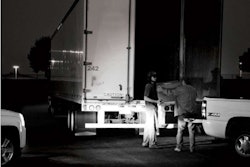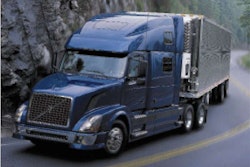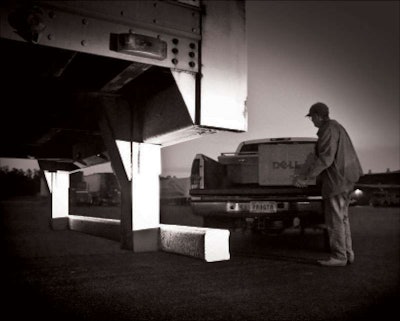
Owner-operator Frank Burgwin left the engine running on his locked Freightliner FLD and rushed into the Earle, Ark., truck stop to grab a takeout hamburger. He planned to be back at his east Texas home that evening in October 1999.
But when he stepped out of the store, he felt his stomach tighten. His tractor and the flatbed with 48,000 pounds of aluminum had vanished.
Burgwin says he thought it might be a joke. “Then it hit me,” says Burgwin.
He and the off-duty Consolidated Freight driver who gave him a ride found the tractor that day off of I-40 near West Memphis, Ark., close to a truck stop. A trailer stolen from south Texas was hooked to his truck. Never recovered were the cargo and trailer, owned by Prime Inc., to whom he was leased.
Cargo theft has worsened since Burgwin’s incident more than a decade ago, with steady increases since 2005. The crime spiked 12 percent in one year to a record high in 2009.
The FBI estimates cargo theft losses range from $10 billion to $15 billion annually. Add indirect costs – such as law enforcement, loss of sales and revenue, costs to carriers and insurers – and the total is two to four times that. In addition, many thefts go unreported.
Experts say this trend is due to increasingly organized crime rings, tough economic times and lenient sentencing for those who are convicted. In response, many in the supply chain have increased preventive efforts and cooperate more closely with law enforcement and insurers.
Truckers are a key part of the close communication experts say is needed to fight the crime. They are also among the victims. For example, an owner-operator might suffer when both cargo and equipment are stolen, or when insurance fails to provide adequate coverage, or when a carrier maintains a strict policy of releasing leased operators who have experienced cargo theft.
While California, Florida and Texas historically have had the most cargo theft due to those states’ trade ports and routes, thefts have risen in inland states such as Georgia, Tennessee and Illinois. Much cargo is stolen on weekends and flows to Latin America or South America, says Ed Petow, law enforcement liaison with FreightWatch International and former commander of Florida’s Miami-Dade Police Department’s cargo theft unit.

Thieves can figure out where distribution centers are for certain products, Petow says.
“They watch the trucks leaving and follow them,” he says. “Any load that could be easily sold, like computers and food, is vulnerable.” Most of the crimes are highly organized, especially for high-value loads of consumer electronics and pharmaceuticals, Petow says. In the United States, cargo thieves are mostly nonviolent but have blink-of-the-eye finesse, says Sgt. T.J. Salazar of the Houston Police Department. “They’re pretty well pre-planned on what they’re after, dispose of their property pretty quick and take it to a warehouse,” says Salazar, an auto and cargo theft specialist. “Unless you catch them in the act, it’s very difficult to solve.”
The security industry is quick to adapt the latest technologies, such as GPS and other wireless systems, but thieves play leapfrog. They often use inexpensive two-way radios, which can’t be tracked, and are savvy about disabling tractors or trailers equipped with GPS systems that are visible, experts say.
“What we’re seeing is more sophisticated techniques with use of cell phones, or they go into a plant with fake paper work,” says Lt. Twan Uptgrow, of Miami-Dade Police Department’s cargo theft unit, the nation’s oldest multi-agency task force devoted to the crime.
Crooks tend to distract drivers with commotion or prostitutes. Sometimes they break into a trailer while drivers sleep and unload cargo into pickups, or they break into an unattended cab and hot-wire it. “These guys can steal your rig in about 90 seconds,” says J.J. Coughlin, law enforcement services director at LoJack Supply Chain Integrity.
In the United States, it’s so easy to steal cargo that the thieves don’t need excessive amounts of sophisticated gadgetry, Petow says. Thefts are more sophisticated and more violent in Europe and Latin America, he says.
Other proven methods include bribing a driver to drop a load, gaining inside knowledge from company employees, or driving a truck and giving counterfeit paperwork to security guards. In 2009 there was a spike in armed robberies at warehouses, hijackings where drivers were forced out at exit ramps or stop lights at gunpoint, and thefts of tractor-trailers.
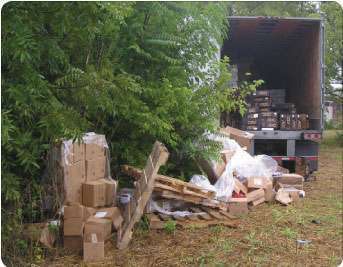 Dallas police say this cargo heist was foiled in 2008 when a patrol officer spotted the stolen trailer in a field.
Dallas police say this cargo heist was foiled in 2008 when a patrol officer spotted the stolen trailer in a field.In California alone, nearly 300 tractors and trailers were stolen in 2009. About a third are unrecovered and thought to have moved south of the border, says crime analyst Merri Hawkins of the California Highway Patrol. Much of the recovered equipment was stripped of tires and major parts.
One of California’s 2009 truck thefts happened to former owner-operator Michael Keith, of La Verne, Calif. His 2003 Freightliner Columbia was stolen from a Pomona, Calif., street, where it was parked overnight, in January 2009, only seven months after he bought it. A city with a large trucking hub, Pomona averages about 12 trucks stolen monthly, police told Keith.
“When you leave your truck, put a kill switch in it or a tracking device,” advises Keith, 50. “Make sure you buy the right insurance for your truck that will cover the down payment and loss of possessions.” Having something like household insurance would have helped in the loss of tools, map books and family gifts, he says.
Rehired as a driver by his former company, Keith is trying to save $10,000 for a tractor down payment.
John Bertling, CEO of Best Sand & Trucking in Iola, Texas, is still recovering from the $300,000 worth of equipment the ring’s conspirators stole from his lot last year.
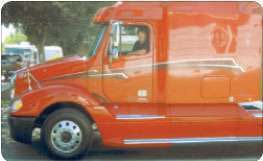 Michael Keith had owned his 2003 Freightliner Columbia less than a year when it was stolen from a Pomona, Calif., street.
Michael Keith had owned his 2003 Freightliner Columbia less than a year when it was stolen from a Pomona, Calif., street.Thieves drove two of Bertling’s new Peterbilt 379s and pneumatic trailers from the company’s parking lot on Jan. 17, 2009, and security cameras recorded the tractors crossing the Mexican border. Salazar and others discovered the thieves got the trucks’ serial numbers and had keys made for them. Bertling later installed GPS units and Lo-Jacks in the cement company’s trucks so that if anyone bothers his equipment, a signal warns police officers.
The increase in cargo theft last year caught carriers by surprise, experts say. Many carriers ramped up security at facilities and others trained drivers for theft prevention. Although cargo thefts increased in the first quarter 2010 from the same period last year, there was a “decrease in reported incidents occurring in carrier facilities,” says Coughlin, who directs the Supply Chain Information Sharing and Analysis Center.
Prime, which delivers time-sensitive refrigerated foods, includes a four-day class on cargo and equipment theft in its driver orientation. A former FBI special agent, Prime Security Director James Morton supervises a 22-member staff of former law enforcement officers and works with volunteer task forces across state lines, he says.
Drivers are often bribed into dropping a load, a practice that many say has worsened during the recession. Aware of such risks, Morton does “the best background check we can do,” meets weekly with drivers and sends them crime alerts. Meetings with truck stop owners have started, as well, because cargo thefts are hurting their business, Morton says.
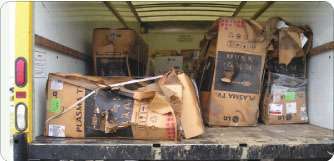 Thieves were offloading plasma TVs from a stolen trailer onto a straight truck when patrol officers stopped them. “The crooks escaped, but most of the load was recovered,” Dallas Police Sgt. Dave Landry says.
Thieves were offloading plasma TVs from a stolen trailer onto a straight truck when patrol officers stopped them. “The crooks escaped, but most of the load was recovered,” Dallas Police Sgt. Dave Landry says.Joe Wehrle, chief executive officer of the National Insurance Crime Bureau, says the bureau has retrained some of its agents to cover cargo theft, which increased over car thefts in the last few years. In refrigerated loads such as food and pharmaceuticals, costs are astronomical for insurers and the health risk to consumers is immeasurable. “Once you get a trailer stolen, the chain of custody to insure that no one could tamper with the cargo is lost,” Wehrle says.
Historically, truckers waiting over the weekend for receiving facilities to open are prime targets for cargo thefts. “This schedule often leaves truck drivers with few alternatives to secure their loads,” Coughlin says. “The thieves are well aware of these vulnerabilities.”
But last year, carriers and shippers formed tighter networks to allay that problem, says American Trucking Associations’ Susan Chandler, director of its supply chain security council. She says last year UPS, Con-way, Swift Transportation and Old Dominion heightened security in response to thefts, many of them in Dallas, Houston, Laredo and El Paso, Texas.
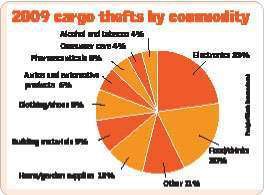
Despite tight budgets, Illinois and Georgia recently formed special cargo theft units. Special Agent John Cannon, head of Georgia’s Bureau of Investigation’s major theft unit, says he and other agents opened 71 cases and made 50 arrests since its January 2009 launch. In that time his unit seized $17 million in stolen goods, and assisted in collecting $1.2 million in drug contraband.
Cannon says the state’s hot spots for cargo theft are Atlanta and along the I-95 corridor in Savannah. Cannon talks daily with federal agents and Florida police and meets monthly with the Southeastern Transportation Security Council, a group of businesses in the supply chain.
“This requires a lot of interaction with private industry, or in some cases with individual owner-operators,” Cannon says. “We recover loads before they’re ever reported stolen.”
Two years ago, Sgt. Steven Covey headed the then newly formed Illinois State Police cargo theft unit to fight increasing crime in Chicago’s major shipping hub. His team has worked on more than 70 cargo theft cases, made 21 arrests and recovered more than $4 million worth of goods.
“Warehouse burglaries and organized crime in cargo theft – these are on the increase,” Covey says. For example, $75 million worth of antidepressants was taken in March from an Eli Lilly & Co. warehouse in Enfield, Conn.
The harsh economy, which has lowered tax revenues available for most publicly funded services, has taken a toll on law enforcement units. “Cargo thieves know they can go basically undetected,” says Uptgrow, of Miami-Dade Police. “This problem is just too big without more federal funding.” n
Fighting a high-pay, low-risk crime
Nearly 10 years ago, Sheriff Ed Dean of Marion County, Fla., stamped out cargo theft in his county. That was only the start of his crusade.
Since 2002, he’s advocated stiffer penalties for a crime that typically draws light prison sentences, is highly profitable and easy to get away with, and generally escapes public attention.
In 2006, Dean and the National Insurance Crime Bureau started a national cargo theft task force. The group pushes for funding for the Federal Bureau of Investigation to pursue thefts, a uniform system for reporting them and stiffer penalties for the crimes.
“Thieves are moving out of drugs and moving into cargo theft,” says Dean. He cracked down on cargo thieves in Marion County by authorizing sheriff’s detective Thomas Bibb to run undercover operations at four truck stops near I-75. Thefts countywide dropped from $1.2 million to zero. Cargo theft, he says, “is so lucrative, with the potential for supporting terrorism, and is so easy to get away with.”
Prison sentences vary widely by state because cargo thefts can be classed as robbery, burglary, grand theft or theft of property or vehicles, and often have no mandatory minimum sentence. If convicted of cargo theft at the federal level, thieves can be sentenced to a maximum sentence of 10 years.
Task force members are urging Congress to make a cargo theft statute with minimum mandatory sentencing for first-, second- and third-time offenders.
“You’re arresting the same people over and over and over again for stealing millions of dollars of cargo,” Bibb says.
Dean and others celebrated a small victory when the FBI implemented the Uniform Crime Reporting Code for cargo theft, the first time a new code has been made since 1990. It offers a standard method to report thefts in the bureau’s crime database.
“It’s going to take some time to populate that database,” says Chuck Forsaith, supply chain security director at Purdue Pharma Technologies, which makes the painkiller Oxycontin. “But it will allow the FBI and everyone else to know how bad cargo theft is.” Forsaith’s department recovered $75 million in pharmaceutical thefts last year and $17 million the year before.


